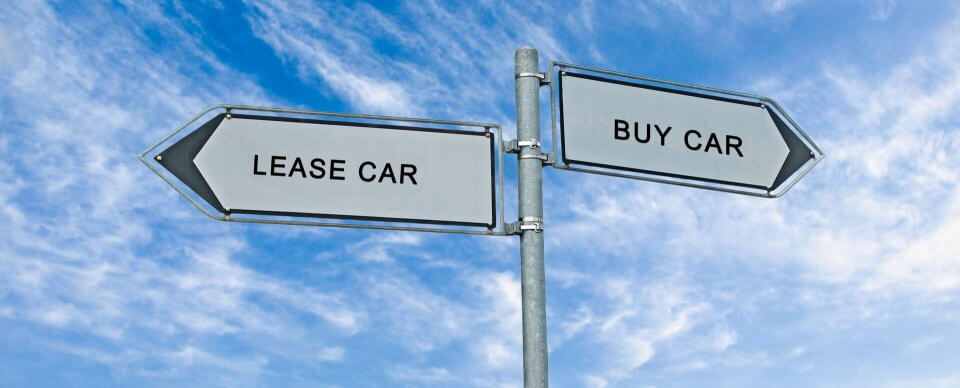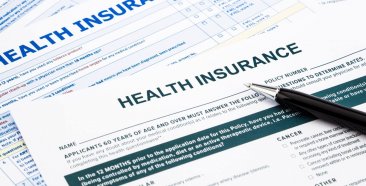
If you’re one of those drivers who have never done it, but wonder if leasing a car makes more sense than buying, you may be disappointed. That’s because there are several good reasons for both. And, depending on your driving habits, length of commute, along with other factors, you may want to approach your final decision with as much information as you would when shopping for auto insurance.
Some people are okay with always having a car payment – because they trade in their vehicles often or they tend to finance with long-term loans. For them – leasing is a good choice. But, there’s more to it than that.
In fact, new-car shoppers are divided into two categories with strong opinions: those who buy and those who lease. Most buyers like the peace of mind that comes with owning their vehicle. However, leasers have the chance to upgrade their car more easily. There are many factors that come into deciding what approach to take with your vehicle. Learn all you need to know to make an informed decision and get the better deal for your daily transportation needs. Let’s get into buying vs leasing a car!
How Does Buying A Car Work?
This is the most traditional method of getting a car: buying it! Unless you have the total amount of money at your disposal, usually you take out a loan to pay for the new ride, which depends on factors such as down payment or trade-in.
The car isn’t really yours until you finish paying the car loan which you can get from a bank, credit unions and finance companies. You do this with monthly payments that are calculated based on the price of the car, your down payment and interest rate.
Advantages Of Buying A Car
Ownership
One of the biggest advantages of buying your car is that you’ll own it after paying it off. Buyers know that if they pay cash or hold on to the car past the payoff date of the loan, they’ll most likely come out ahead financially. The counter argument to that might be you’ll be on the hook for repairs once the factory or extended warranty expires. But, logically, whatever needs repair or replacement will undoubtedly cost you less every year than a seemingly endless string of car payments.
Early Termination
As the owner of the vehicle, you can sell it as you see fit once you don’t need it or want to change models. However, while not ideal, you can also do this before you’ve finished paying off your loan. You can actually sell or trade in your car, and the money from the process can be utilized to help you with the remaining debt.
No Mileage Restrictions Unless for Sale
Your car, your rules. You are free to drive the amount of miles you see fit. Want to go on that three day road trip? Have a blast! You have a two hour daily commute? No worries! The only thing you have to keep in mind is that the higher your mileage, the more value your car loses once you want to sell. It’s worth mentioning that regarding insurance, you could apply for a low-mileage insurance discount.
Wear and Tear
Same as with mileage, you can decide whether or not you want to fix any issue your vehicle may have, like dents or scratches. This will also affect the resale value of your car, but you can choose to fix it before the sale or not. In other words, you don’t have to keep your car in mint condition in order to sell.
Customizing
You can make your car really your own. From a new paint job, window tints to adding sport seats, you can customize your vehicle to fit your preferences and budget.
Fixed Number of Monthly Payments (Done When Loan Is Paid Off)
This is a pretty simple but very compelling argument: once your loan is done, you don’t have to keep paying. It seems obvious, but it’s an important advantage if you compare it with a leased car. In that scenario, if you want to keep driving, you have to keep paying every month.
It Helps You Buy Your Next Car
If you plan on getting a new car, you don’t have to start from zero. You can use your current vehicle to either sell it yourself and have cash for a down payment, or trade it in with your car dealership. This advantage can easily tilt in favor of when a certain type of vehicle has a higher-than-average resale value, which will result in you getting more at the time of trade-in.
Disadvantages Of Buying A Car
Higher Monthly Payments
If you plan on buying a car, keep it mind that the monthly loan payments tend to be quite higher than leasing. This can definitely affect your wallet in the short term, although it can be offset when you remember that you’ll have ownership in the long run. Still, having high monthly payments is no easy feat. It takes into account the full purchase price, along with interest, taxes and fees.
Upgrading to Another Vehicle
If you want to upgrade to a more modern car or brand, you’ll probably have to sell your current vehicle. That implies taking care of the sale, looking for the right replacement, negotiating with that car dealership or owner, paperwork… It can be a lot. With proper financial and time management, you can upgrade without much trouble.
Car Depreciation
Sources like BankTracker mention that a car loses between 15% to 25% of value 5 years after their purchase. That means that your resale price will always be lower than what you paid for initially (unless you customize it properly, which implies investing even more). Also, predicting the resale value of the car can be tricky and never 100% certain.
Larger Down Payment
Since your monthly payments will depend on how big your down payment is, the number will be much higher than if you lease. This will give you better terms for your car financing regarding loan rates and loan length because you pose less of a risk to the bank, credit unions, or another lending institution.
Warranty Will End
A warranty can give you peace of mind, since with it the provider agrees to fix or replace any car parts that have defects due to manufacturing (don’t mistake it for a full coverage auto insurance, since a warranty doesn’t cover accidents and more). However, normally a car warranty lasts approximately three years or for the car’s first 30,000 miles (whichever comes first). In other words, if you own your car, your warranty will end and you’ll have to take care of such repairs yourself, which can really make a difference.
What’s Leasing And How Does It Work?
To counter a purchase, car leasing is also available. Instead of paying for ownership of the vehicle, you pay to drive it for an agreed upon length of time. When you finish the time on the contract, you can walk away or lease a different car. This brings along its own set of characteristics that many drivers prefer that make the choice a more economical option. According to Statista, 18% of new vehicles in the United States were on lease in the 3rd quarter of 2022. Rounded up, it means that 1 in 5 of new-car transactions were leases.
Advantages of Leasing a Vehicle
Lower Monthly and Down Payments
A strong case for leasing is that you’re paying for a vehicle’s depreciation only over the term of the lease, resulting in a lower monthly payment than if you financed the entire cost.
An example of how buying could cost you more money would be if you purchase a 2015 Chevrolet Malibu 1LT listing at $24,560 with a 60-month loan and 10% down at Chevy’s 2.9% financing. Your payments on the Malibu will be $396 a month. Now, should you feel the urge to trade in the car at the end of three years, according to Kelley Blue Book’s estimated resale value, you’ll probably get around 50% of the original sticker price, or $12,280. In the end – your total out-of-pocket cost at trade-in will be about $13,290.
However, with today’s attractive low lease options, you can lease the same Malibu for $179 a month for three years with $1,209 down. Your overall cost will be about $8,650 over three years, which includes the fees leasing companies typically impose – such as a front-end acquisition fee ($600 to $800) and a back-end disposition fee (about $350). In this case, leasing would leave more than $4,600 in your pocket over buying. Of course, these benefits apply when you think in the short term, since in the long run a purchased car will stop paying monthly fees.
Latest Technology and Models
Leasers can avoid the hassle of scheduling, meeting, negotiating and reselling their current car in order to finance their new one. Meanwhile, supporters of leasing enjoy the flexibility to trade up to a brand new vehicle when they get bored with the one they have directly with their dealership.This way you’d have access to the latest safety, connectivity and entertainment technology.
Vehicle Return
Once you’re done with your leased car lease length, you can simply return it at your dealership and forget about it. There won’t be any parking, storage or transportation costs involved. That said, you should check and be aware of any extra fees that you could incur.
Warranty Coverage
The majority of dealership leases are written for a term of three years, which means the leased vehicle is almost always under warranty.
Disadvantages Of Leasing A Vehicle
No Ownership
The main case against leasing is that at the end of the term you don’t own the vehicle. On the contrary, it’s the leasing company that holds the title. This affects pretty much everything else on this list, since you don’t have the freedom to drive or modify the vehicle as you’d like.
Never Ending Monthly Payments
Because the car is never yours, you’ll always have to pay each month if you want to keep driving. In contrast, if you purchase a car you’d stop paying after the agreed upon payment period. So, even though the monthly lease payments are lower, in the long term you can end up paying much more.
Early Termination
Furthermore, an early-termination fee will likely be in effect should you want to get out of the lease term, which can get expensive. But a dealer may allow you to take advantage of a “pull-ahead program,” which lets you return your current vehicle to the dealership and lease a new car, quite often at more-favorable terms.
Mileage Limits
In contrast with purchasing, mileage is typically capped at 12,000 to 15,000 miles per year with as much as 20 cents per extra mile at the end of the lease agreement. So, if you intend to commute long distances or use the vehicle for work, you may want to consider buying instead of leasing.
You Need to Keep It in Good Shape
There are additional things to consider before leasing. For instance, excessive wear and tear could cost you. Although leasing companies usually won’t dock you for surface scratches or a less-than-perfect interior, they may charge you for dents or other visible proof of abuse or neglect.
No Customizing
Forget about changing the leased vehicle’s color, tires or other accessories. Typically the leasing company will request that you return the car in the same condition it was initially given to you.
What’s Best for You?
As you can see, this depends on a variety of important factors. Both can benefit and limit you in different ways. To summarize the big buying vs leasing a car question, leasing is a great option for those who don’t want a big financial commitment and are more interested in driving more expensive cars.
On the other hand, a purchase is a good idea for those who are looking for a car for the long run and don’t want any restrictions in their driving like mileage and customization. As with any major financial decision, you need to do your research to see what’s the better choice for your situation.
Regardless of what side of the “buying vs leasing” fence you’re on, you need affordable auto insurance to drive your new ride off the lot. With Freeway Insurance, getting the best auto insurance rates to protect your vehicle can save you a great deal of money over the course of your lease or loan. Why not get a free auto insurance quote comparison online or over the phone at 800-777-5620 today? If you prefer, you can also talk to an insurance agent in person in any of our offices.



